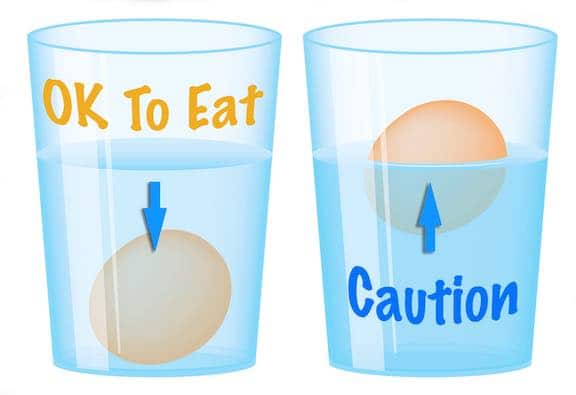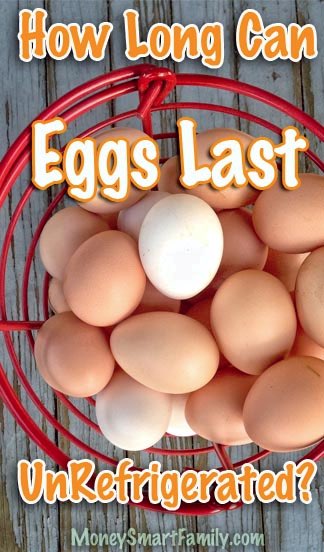Have you ever thought long and hard about the eggs we eat?
What About Questions Like:
- How long can eggs last unrefrigerated and refrigerated?
- Or, “How can you tell if the eggs you have are going bad?
- Does the nutritional value of an egg change as it ages?
- How long can eggs be left out on the counter?
In this article, we’ll answer all these egg questions and more.
TABLE OF CONTENTS
- 1 Egg Storage Around the World
- 2 Why We Care About Eggs on a Money Site
- 3 What Are USDA Rules for Storing Eggs?
- 4 How Long Can Eggs Be Left Out Unrefrigerated?
- 5 What Are the Different Types of Eggs?
- 6 Egg Storage Temperature
- 7 How Long Can Eggs Last Past Their Expiration Date
- 8 Why Are Eggs Stored Differently in Other Countries?
- 9 How Long Can Fresh Eggs Last?
- 10 Can Eggs be Frozen?
- 11 How Long Can Eggs Last Unrefrigerated Summary
Egg Storage Around the World
One of my favorite things to do when I travel is to visit local grocery stores. I enjoy comparing the similarities and differences. In Iceland, grocery stores have a line of cookies called “Maryland.” In France, quail eggs are a common grocery store item.
One notable difference between Europe and the United States is that eggs are not stored in the refrigerator case. Instead, eggs are on non-refrigerated shelves, next to crackers and other shelf-stable goods.
At first, I thought these were eggs from a different animal. After all, something had to be different, right? Isn’t it safe to keep chicken eggs on the counter in the United States if it’s safe to keep chicken eggs on the counter in Italy and France?
Chickens are chickens, right?
Of course, they are, though what we do with the eggs is what makes the difference in storage.

Here’s what we know about eggs in America
– Chicken eggs are a staple of the American diet;
– Chicken eggs are readily available in any grocery store; and
– Chicken eggs are always stored in the refrigerator.
So, with these things in mind, what’s the deal with unrefrigerated eggs in other countries? And how long can eggs last unrefrigerated in the U.S.?
Why We Care About Eggs on a Money Site
Eggs might be the perfect food. They have high protein, great taste, and versatility. Hard boil them and enjoy a great on-the-go snack. Make a soufflé and wow your friends. Whip up a quiche or frittata and have a quick, easy, and healthy mid-week meal.
But no matter how you cook them, they cost money. And we’re all about saving money.
So whether you buy them at the store or have your own laying hens, we want to help you store your eggs safely.
Breakfast foods are among the cheapest and easiest to prepare. They are also the most versatile foods around. Many egg products such as omelets and Strata taste great and are easy to prepare.
Eggs are also suitable for freezing (more on that later).
Eggs Can Get Expensive
As with all foods, the cost of eggs can add up.
Plus, these days the grocery stores rarely sell simply “eggs.” There are all sorts of labels and things to consider such as organic versus “regular,” Grade A versus Grade B, cage-free, and so on.
It’s always a good idea to know where your food comes from. Ensuring you are making choices that will satisfy your taste buds and your budget is key. The more you know about food storage, the better the choices you can make for your family. So go ahead and ask if eggs last unrefrigerated.
What Are USDA Rules for Storing Eggs?
The United States Department of Agriculture (USDA) is responsible for providing leadership in keeping food safe. Their job is to create and enforce federal standards for food safety and food storage.
The USDA requires preventative steps for all commercial farmers in the United States – see this article on USDA Food Safety. These steps include best practices for farming eggs.
These best practices are necessary because eggs can transmit salmonella. A dangerous bacterium that is potentially life-threatening, salmonella can exist on the outside of an eggshell. This is because hens lay eggs through the same passageway that they move feces. Bacteria can then exist on the unclean shell.
No one wants to eat bad bacteria, right?
So all eggs graded by the USDA must be power washed to remove all bacteria from the eggs.
The catch is that while cleaning the eggs removes the bacteria, it also removes the natural coating that covers the egg. Ironically, removing the coating leaves the egg susceptible to further contamination.
That natural coating is nature’s way of doing exactly what the USDA wants us to do with the eggs: protect against bacteria. So no American eggs last unrefrigerated.
Should You Seal Your Own Eggs
It’s possible to create your own coating for farm-fresh eggs, known as “bloom,” by applying a thin layer of mineral oil. If you are interested in learning more about applying a mineral oil coating, read this article about the practice. This is easily done by hand. The mineral oil helps to protect the porous surface of the egg from invasive bacteria.
There is no reason to apply a mineral coating to eggs purchased from the store because once the egg has been refrigerated, it really should stay that way until you’re ready to use it.
How Long Can Eggs Be Left Out Unrefrigerated?
Have you ever forgotten to put your eggs away after cooking with them? Many people wonder how quickly they can “go bad.”
At MoneySmart Family we regularly use room temperature eggs to make dessert crepes. Get the recipe here. We’ve never had a problem leaving eggs on the counter for several hours.
However, the experts at the USDA recommend never leaving eggs unrefrigerated for more than 2 – 3 hours.
A cold egg left out at room temperature can sweat, facilitating the movement of bacteria into the egg and increasing the growth of bacteria. Refrigerated eggs should not be left out more than 2 hours.
USDA Website – Article “Shell Eggs from Farm to Table”
What Are the Different Types of Eggs?
The USDA has established guidelines – available here – to identify the characteristics of eggs in addition to creating federal standards for farming.
Grade AA is the highest quality, free of visual defects.
Grade A eggs are the most common. They might be less than perfect in terms of shape. To the untrained eye, they don’t look any better or worse than any other egg. And, of course, they are great for cooking.
Grade B eggs may not be as pretty. They may have slight stains on the shell or be slightly wider or flatter than their Grade A or AA counterparts. These eggs are often sold at a discount. They are often used as liquid or frozen egg products where the appearance of the shell does not matter.
RELATED ARTICLE: How to Save with Grade B Eggs
Organic Eggs

but not in the United States.
To qualify as organic, eggs must come from chickens that are fed an organic diet and live a cage-free existence. In other words, healthier chickens supposedly lay healthier eggs.
Organic eggs cost quite a bit more, sometimes as much as two to three times the cost of conventionally farmed eggs. This is due to the more expensive diet and other costs associated with free-range living.
Free Range Eggs
You might also see the “free-range” designation on eggs. Keep in mind that while all organic eggs must be free-range, not all free-range eggs are organic.
“Free-range” means that chickens may have a concrete pen instead of a small cage, but not necessarily free-range to wander the farm. Free-range chickens may also eat non-organic feed.
RELATED ARTICLE: Organic Food on a Budget
Egg Storage Temperature
Refrigeration of eggs has everything to do with trying to minimize the spread of salmonella. Storing eggs in a cold environment is designed to curtail this. The USDA recommends a temperature of 40 degrees Fahrenheit. So do eggs last unrefrigerated?
Once eggs are refrigerated, they should remain so until you’re ready to use them. Letting a cold egg come to room temperature causes condensation to form on the shell. That condensation can harbor bacteria and invite salmonella. Again, no American eggs last unrefrigerated.
How to Avoid Salmonella
Since chicken eggs are naturally porous, the salmonella on the outside of the shell can be transmitted to the inside. If you eat a contaminated egg, you could become seriously ill.
According to the Center for Disease Control, fully cooking a contaminated egg to 160 degrees will totally eliminate salmonella.
Refrigeration does more than prevent condensation and the contamination that can result. It also slows the breakdown of the egg over time. This is true of many fruits and vegetables as well. We could leave them on the counter, but they would ripen faster and not last as long.
Learn more about refrigeration concerns and standards from the USDA.
Eggs are the same way. Maintaining colder temperatures slows the breakdown of yolks and whites. The longer your food lasts, the farther you can stretch your budget.
How Long Can Eggs Last Past Their Expiration Date
According to the LA Times, the float test is the best way to verify an egg’s freshness.

Place an egg in a bowl of water. If it sinks, it’s safe to eat. If it floats, it’s on the older side, but could still be okay for consumption.
Crack open the floating egg and check for any unusual colors or smells. If the egg looks like an egg and smells like an egg, it’s probably fine to eat, according to the USDA. It’s not uncommon for eggs to be acceptable to eat several weeks past the due date stamped on the carton.
The sell-by date on the carton of eggs is an important guideline to help you know how long your food is safe to eat. There is no substitute for common sense, however.
Why Are Eggs Stored Differently in Other Countries?
That salmonella can exist on eggs is an undisputed fact. Also factual is that salmonella is very serious. Contracting salmonella can cause serious illness or even death. It is not something with which to mess around.
The LA Times also notes that the difference in egg storage between the United States and Europe is not because of the chickens or the eggs. The difference is because of the approach to addressing and preventing salmonella.
The European method takes steps to prevent salmonella before the egg is laid. The American method takes steps to prevent salmonella after the egg is laid.
It really is that simple. Do eggs last unrefrigerated is a good question to ask after all.
How American Egg Producers Process Eggs
American factories power wash eggs to prevent any bacteria from entering the egg through the shell, according to NPR.
As a result eggs in the U.S. need to be refrigerated from that point forward.
The shells are porous, and once washed, they no longer have their natural protective coating. Allowing eggs to come to room temperature causes condensation to form on the eggs. Salmonella can develop in condensation.
Antibiotics vs No Antibiotics
Europeans proactively treat their chickens with antibiotics. This ensures that eggs are not laced with salmonella in the first place.
American convention is to avoid treating animals with antibiotics where possible. This practice has its benefits, but a byproduct is that eggs can then carry salmonella, which is a major health concern. It’s good and bad that no American eggs last unrefrigerated.
RELATED ARTICLE: 6 Reasons Why Eggs Are So Expensive?
How Long Can Fresh Eggs Last?
According to the USDA, uncooked fresh eggs in the shell can last anywhere from 3-5 weeks. The USDA does acknowledge, though, that the float test and the “common sense” test may prevail.
There are some ways to store eggs, as well. Hard-boil them, and they will last in your refrigerator for about a week. They make a high-protein, tasty snack.

Precooked products such as casseroles, quiches, pies, or other goods can be frozen for anywhere from 2-6 months.
Home “grown” eggs do tend to last longer than store-bought eggs, but that has nothing to do with the egg itself. It has to do with logistics.
Consider that egg farms and factories are located throughout the United States. Those eggs must be gathered, washed, sorted, and then shipped via refrigerated truck to your local grocery store.
This is a process that consumes several days off of the shelf life of eggs.
You can expect eggs to be at least a week old once they reach the shelves of your local grocery store. A few weeks may pass before you select that carton and bring them home. You can read more about egg storage from IncredibleEgg.org.
Can Eggs be Frozen?
In a manner of speaking, yes, according to HGTV. But, don’t take a whole egg and place it in the freezer, though. To freeze an egg, first, you’ll have to break it open.
Break eggs into a bowl, and beat them. You can then freeze the liquefied egg.
Try ladling the liquid egg into ice cube trays. That way you have a cube to pop out and use as needed for scrambling or baking.
Or if you want to be more precise with portion control, beat an individual egg and pour it into a greased muffin tin. Once frozen you can transfer the frozen eggs to a zippered plastic bag.
You could also place liquid eggs into a plastic freezer bag and freeze them flat.
Finally, to defrost, place the frozen egg in the refrigerator or overnight and then cook as you normally would.
How Long Can Eggs Last Unrefrigerated Summary
So, can you take your eggs out of the fridge and start storing them on your counter, as the Europeans do? That is not recommended. Remember, once an egg has been washed and refrigerated, it should stay that way. No American eggs last unrefrigerated and keep you healthy.
If you buy farm-fresh eggs or decide to farm eggs yourself, do you need to power wash them and store them in the refrigerator? No, not unless you decide to sell them as a licensed market or distributer. A quick wash under the faucet before cooking is just fine as long as the eggs were not refrigerated, to begin with.
Bottom line: enjoy eggs as the versatile, budget-friendly, high-protein food source that they are. Perhaps consider owning your own laying hens. You’ll be able to store your eggs on the counter as you wish. You will also have much more time to enjoy them because you don’t have to wait for anyone to process or ship them to you.


